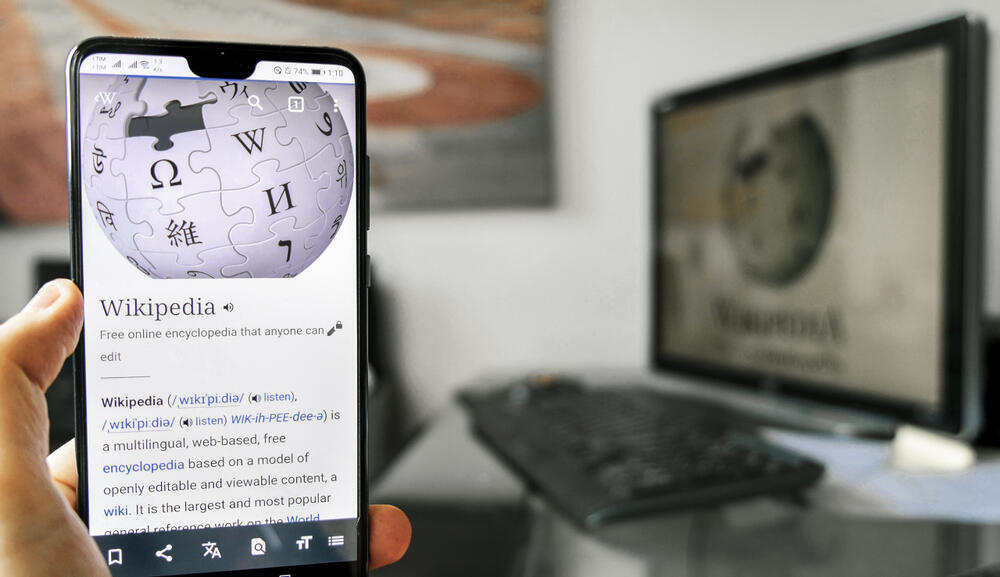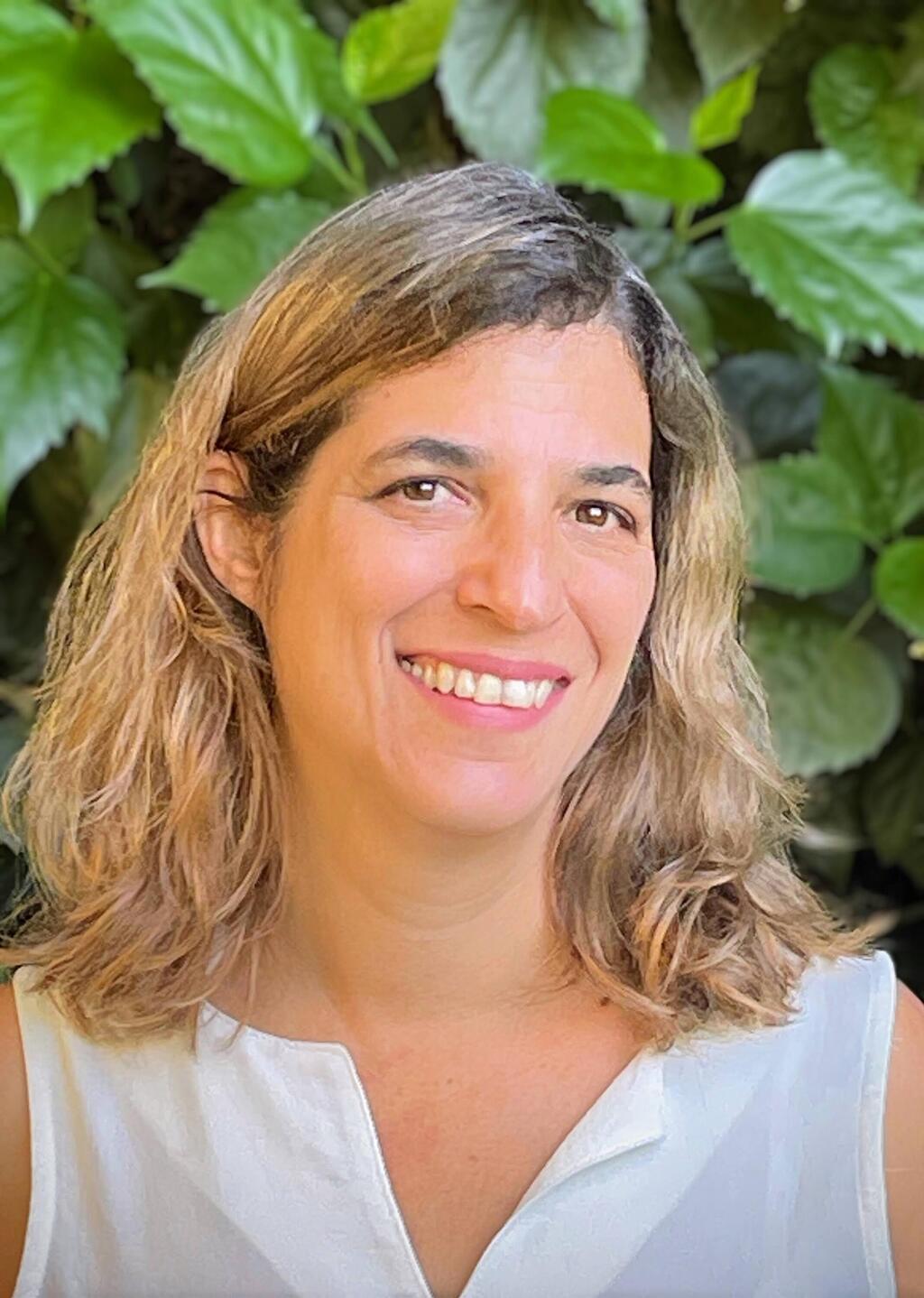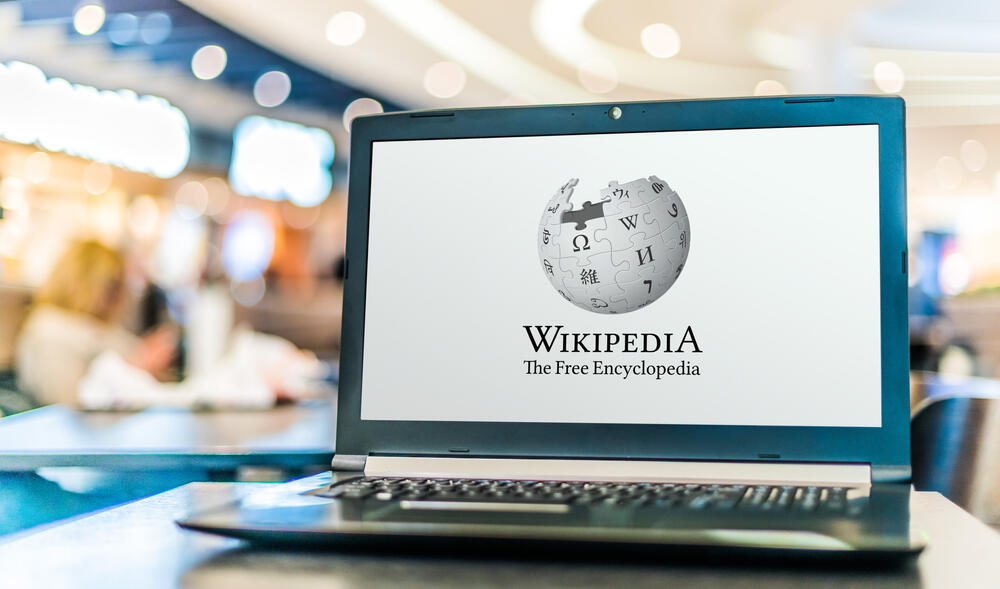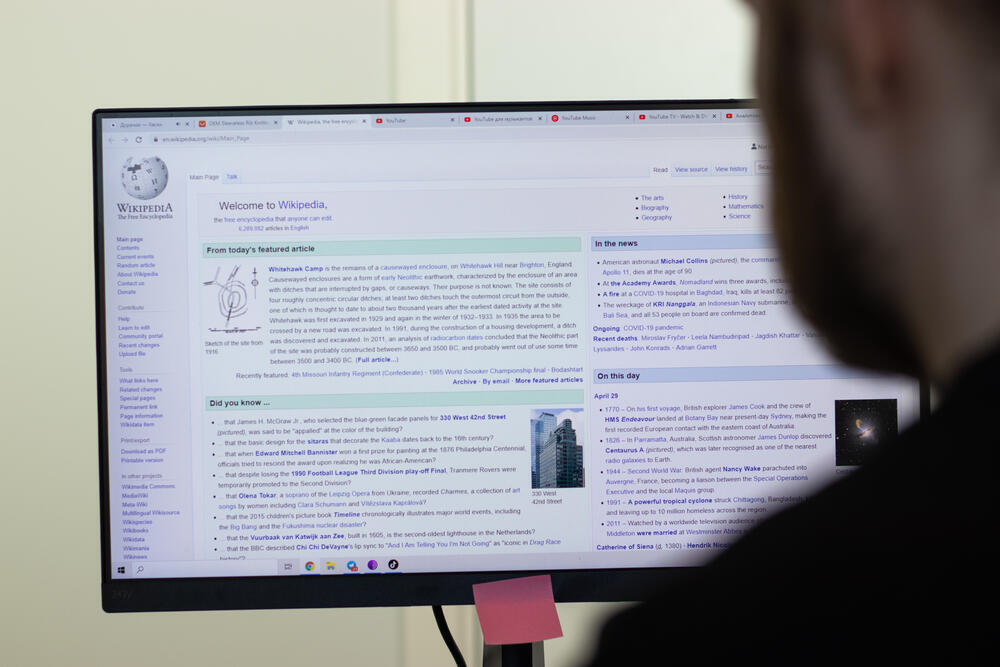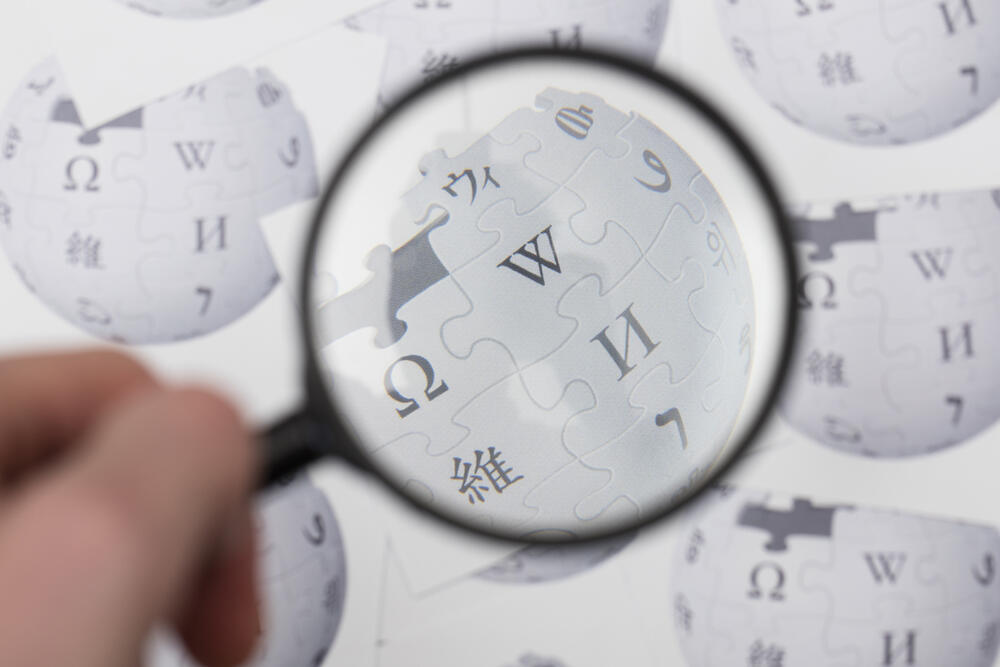Whenever we come across an unresolved question or are curious about a certain topic, most of us instinctively turn to Google. But after we type the requested query, we will most likely turn to the next information source - Wikipedia.
Read more:
It is difficult to imagine our lives today without the platform that has become so obvious. Although it has been criticized time and time again over the years – for not being reliable enough, or for controversies surrounding decisions of what should appear in it, or for the low female ratio among its editors - it is nevertheless difficult to underestimate its value. The pre-Wikipedia era, where homework was done with the help of massive, printed encyclopedia volumes, seems like a distant and unreal memory.
These days, the Hebrew edition of Wikipedia celebrates its 20th anniversary. In honor of the occasion, we met Michal Wander Schwartz, executive director at the non-profit association Wikimedia Israel, a local Israeli branch of the international Wikimedia Foundation which is behind Wikipedia and other projects.
"Wikipedia to a great extent reflects the moods in society," she says. "People are searching for knowledge about topics that interest them. It's easy to guess which entry has been most viewed on Wikipedia in recent times - the Reasonableness standard - and about six months ago, when the whole issue of judicial reform started, these were entries like Yariv Levin and Judicial overhaul."
Wander Schwartz started leading Wikimedia Israel about six months ago. In her previous positions, she led the establishment of the cultural department for children and seniors in Zichron Ya'akov, as well as the Interdisciplinary Center for Studies of Children and Youth at Risk at the Tel Aviv University School of Social Work.
"When I saw the Wikimedia classified ad, it captivated me," she recalls. "I wanted to do something significant, and I think that Wikimedia has a global impact on the world, by making it better, more equal and just. The idea is to make free and equal content accessible - it belongs to everyone. Everyone can edit, change, contribute, which is an empowering experience, and on the other hand, can consume equally. The knowledge is not in the hands of a small group. There is still a lot to be done to realize this vision, and that is what motivates me in this work."
Did you have any prior experience in editing Wikipedia entries?
"No, I knew nothing about this world, I only used it, like most people. Just before I started here, I translated my first entry on Social Thinking, because I wanted to further explore it. It was very interesting. The translation was done by AI software, which also retrieves sources of knowledge, but it is not an automatic translation - the human eye must go over the entry, make an adjustment to the language and culture."
The tool that Wander Schwartz mentions is nothing new, just like other AI tools that are being used in Wikipedia, for example, the error detecting tool; but we have been witnessing a growing tension between human creation and AI since the generative AI tools like ChatGPT entered our lives. The potential threat to Wikipedia for becoming irrelevant is imminent, because people might choose to rely on chatbots for information and abandon the old site.
Wander Schwartz refers to an experiment that global Wikimedia recently started running - a Wikipedia add-on for the beta version of ChatGPT that will allow you to search for answers and summarize information from Wikipedia, plus a reference to the relevant source and links to articles for further reading.
"This is progress because ChatGPT is unreliable - we don't know where the information came from and it also has mistakes; so such an add-on strengthens ChatGPT as well as Wikipedia. It was also claimed that Google takes advantage of Wikipedia, but this is not true because Wikipedia appears among the first results. We also know that the chatbot learns through sources of information that are available on the internet, and one of its major sources is Wikipedia, and it gets the credit. This is the right direction.
"Wikipedia's role today is more critical than ever because ChatGPT and the like are very trendy, it's the latest trend, but without human knowledge, they don't stand a chance, nor do the consumers. Consuming incorrect information can be really dangerous in terms of decision-making. It's true that you need to prepare for it and the foundation does that, but it also strengthens our educational agenda, encouraging people to consume information with a critical eye and active thinking."
You mentioned earlier that judicial reform has been a hot topic among users recently. Is the tense atmosphere in Israel today also reflected in disputes among the editors?
"There is no doubt that the reality is very vibrant, and it is clearly reflected, but it does not affect the rules as such. The rules are very clear, Wikipedia is a fortified wall in this sense. Those who want to write an entry should maintain a neutral point of view, present reliable sources.
"You can see arguments and discussions on the Talk page of the entries, which means that there is no behind the scenes here, everything is transparent and exposed. If you enter a controversial entry such as the reasonableness standard, judicial reform, or Yariv Levin, you can read the entry but also enter the Talk page and see all the reality as you know it, as displayed in the newspaper. The Reasonableness clause was the topic with the most views last month, there is a lot of activity and opinions there, with about 24,000 views this month. This is a high figure."
Wander Schwartz says, "many times people tell me: 'Okay, I understand, Wikipedia receives contributions and contributors write for it, but who is the editor-in-chief?', and my answer is 'You are the editor-in-chief. There is no editor-in-chief, there is no one in charge. Anyone can write, edit, correct and influence'."
She describes the mechanism that takes into account a situation in which discussions can reach serious disputes; in that case, the discussions can be frozen - permission that is granted to particular senior editors.
"They can calm the spirits and allow voting on disputes. Those who have made a hundred edits in the last 90 days, that is, contributed enough, can vote. This is to prevent voting disruptions, and to avoid a situation in which people who still don't understand Wikipedia would skew things out of lack of knowledge." According to Wander Schwartz, since the beginning of the protests against the reform, there have been freezes on disputed entries, "and the freeze is often temporary."
We know that on social media and talkbacks, there are many fake users whose goal is to skew the discourse. Is it something you also experience?
"Yes, that's why there are several dozen people whose job is to monitor the information, alongside bots. It's a 24/7 contributor job. They locate Sockpuppetry, trolls, biases. Sometimes it takes time, but in the end, these things are neutralized. Not long ago, someone from the Kohelet Policy Forum (which is credited with devising parts of the reform) wrote under several usernames. It took a while to discover it, but he was finally blocked.
"Obviously, the more vibrant the society, the more actors seek to influence. Wikipedia is the largest infrastructure of human knowledge, and it is part of the DNA of knowledge consumption for each and every user across the globe, but we follow the same method, and it has been working for 20 years."
The female of man
As part of its activities, Wikimedia Israel runs courses, trainings and tutorials for new editors - some in collaboration with the education system and the academy and some for the general public. In this way, the association hopes to make the editorial community more diverse. One of the loaded topics concerning Wikipedia in the world is the minority of women editors on the platform.
"There are approximately 20% women editors in Israel, and this corresponds with the global figures of 15-20%," says Wander Schwartz. "The figures in Israel are true for 2015, but in October this year we intend to conduct a new survey in honor of Wikipedia's 20th anniversary."
"There are 32 editors that are permitted to do more than the general editing, and only one of them is a woman; but as mentioned before, you need to edit enough to be granted the right to vote. Wikipedia has an entire entry that talks about the gender gaps on Wikipedia. It shows interesting data and talks about the history of women in the public sphere, women's exclusion and inequality.
"Look for example at the Encyclopaedia Britannica. In its first edition in 1771, the entry on horse diseases consisted of 39 pages, and the entry on woman consisted of only four words - 'The female of man'. Apart from history, there are also aspects related to women's self-confidence and lack of interest in dealing with conflicts, but I must say that there are women who write on Wikipedia and do not experience it in this way."
Why is this still happening?
"I think it has to do with the society we live in, and the more it advances, the more change will occur. We in Wikimedia Israel are aware of this gap and are acting to reduce it. An editing course intended for women only will open in October, and we will accompany the contributors during and after the course. This way they will learn how to write an entry and to deal with the conflicts. These courses are often very successful - the entries are not deleted, and the editors do not escape editing."
The activities offered to increase the diversity among the editors are also available for the Arab population. "We work also with the Arab society; they do not work within the Hebrew Wikipedia but contribute to the Arabic Wikipedia.
"We are engaged with the Arab educational system - the teachers are trained to write on Wikipedia, and at the same time teach their students. This is an innovative program that we started this year. We work with the Ministry of Education's superintendent for Arabic, Rawya Burbara, who is responsible for all Arabic studies in Israel.
"The results are amazing - the children wrote 250 entries in Arabic this school year alone. It is very challenging though because the Arab population is partly underprivileged, so the digital literacy is not yet developed enough, and the awareness of the ability to write on Wikipedia and have an impact is also not sufficiently developed."
According to Wander Schwartz, "Our role is to raise awareness and give tools to children and teachers, these are circles that influence each other. This will allow bringing up content that is specifically relevant to the local population. Someone who lives in Morocco does not know what to write about the Arab society in Israel. This year we intend to increase this program significantly; It creates change on every possible scale."
According to her, Wikimedia Israel is the only official branch of the global Wikimedia that is engaged in writing on the Arabic Wikipedia. "There are all kinds of unofficial groups, but there is no other regulated branch like this in the world."
“There is no doubt that the reality is very vibrant, and clearly reflected, but those who want to write an entry should maintain a neutral point of view. There is no editor-in-chief, there is no one in charge"
In addition, the association is currently working on developing an editing course dedicated to people on the autistic spectrum. "This is a population with a very interesting point of view, with a lot of knowledge and the ability to contribute to Wikipedia. As far as I know, no one in the global movement has initiated a course like this. It is innovative and groundbreaking, and I hope others will follow us." We are also aiming at launching an editing course for Israelis living abroad, to strengthen the connection between Israel and the Diaspora through writing on Wikipedia."
Another focus is on increasing the contribution of academic institutions. "These are gold mines of knowledge," says Wander Schwartz.
"Imagine that all faculty members in all academic institutions would write only one entry once a year about their field of activity, let's say on 'Wikipedia Day', this would be a wonderful contribution to free knowledge. Imagine that every student would write one entry as part of their academic studies. There are more students than Faculty members - it will be fantastic for the entire society, for the institutions and for the students themselves. That's where we're heading."
Apart from increasing the number of editors and their diversity, the Israeli branch is aiming to promote the GLAM initiative to encourage cultural institutions to share their resources with the public through collaborative projects with Wikipedia editors.
"This issue in Israel is very sensitive and still in its early stages of development." It involves the transferring of media files in the possession of the institutions, such as photos, sculptures or films to Wikimedia Commons initiative, and then "we connect them to relevant entries on Wikipedia. We recently developed a chart that gives an indication of which content has been viewed and much more data."
It is possible that the institutions' avoidance has to do with financial considerations – the cultural institutions want the public to buy tickets and visit them?
"This is old-fashioned thinking because we see the opposite at large institutions around the world - the more you disclose, the more they want to come to you." Another advantage is the preservation of the art in case of disasters such as fires," she adds.
But some people are afraid to edit. "A lot of people say, 'But what am I going to write about? I'm not an expert, it looks terribly scary.' The work itself is not complex, the tools available are very user-friendly, there is always someone to help, and you don't have to write a thousand-word entry. You can correct, add links, people who master a second language can translate entries. It's a small thing for the individual and a very big thing for Wikipedia, and it's almost addictive - this is what I do on the train on my way home, and I'm exposed to worlds that I wouldn't have been exposed to in my everyday life otherwise.
"We really need the collaboration of as many people as possible. In total, there are currently approximately a thousand editors on the Hebrew Wikipedia, of which several hundred are active, and dozens serve as Wikipedia's protective wall. The more we contribute, the more we can receive, and this is essential. We want to shift people from being passive, i.e. consuming knowledge, to active - creating knowledge. It's a process, but we have still got time."



